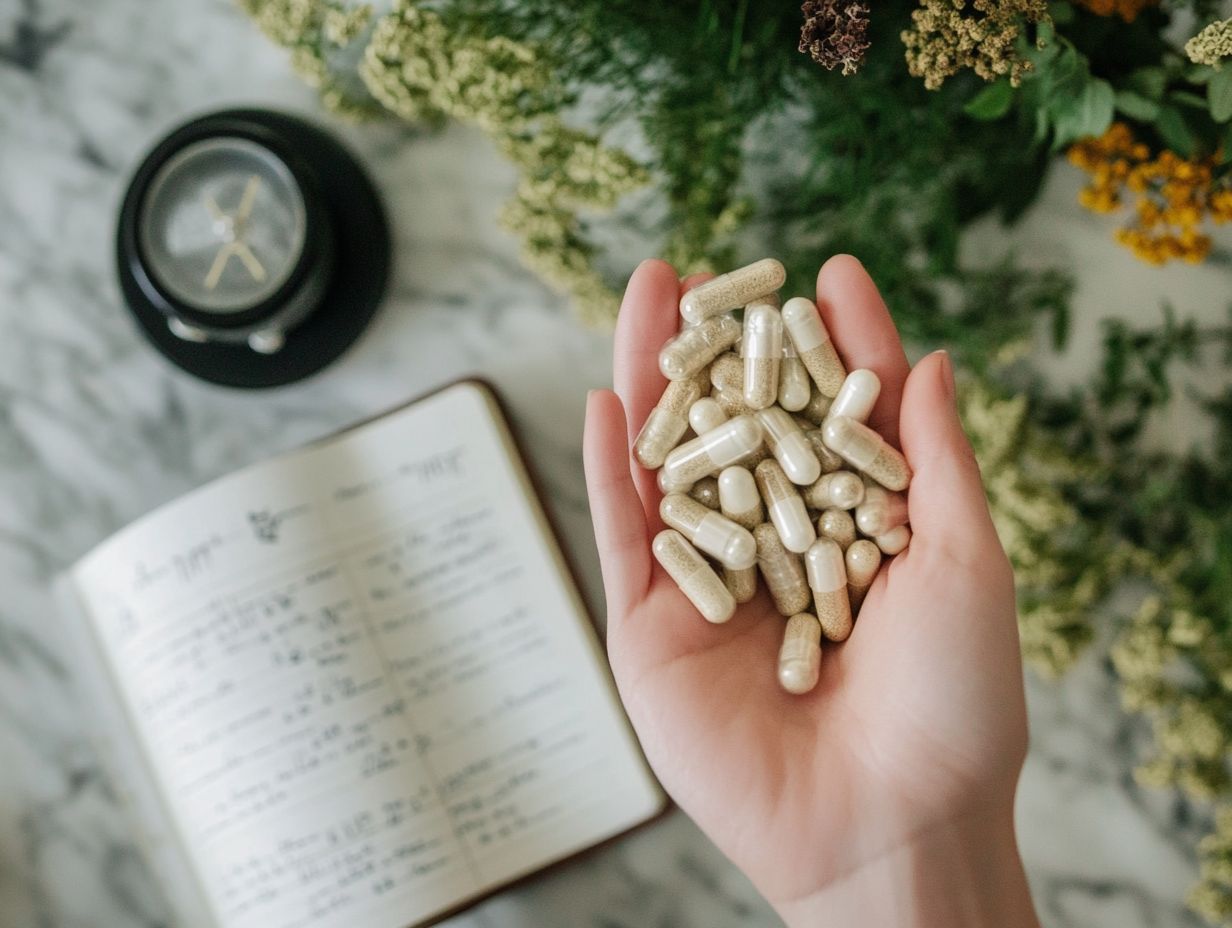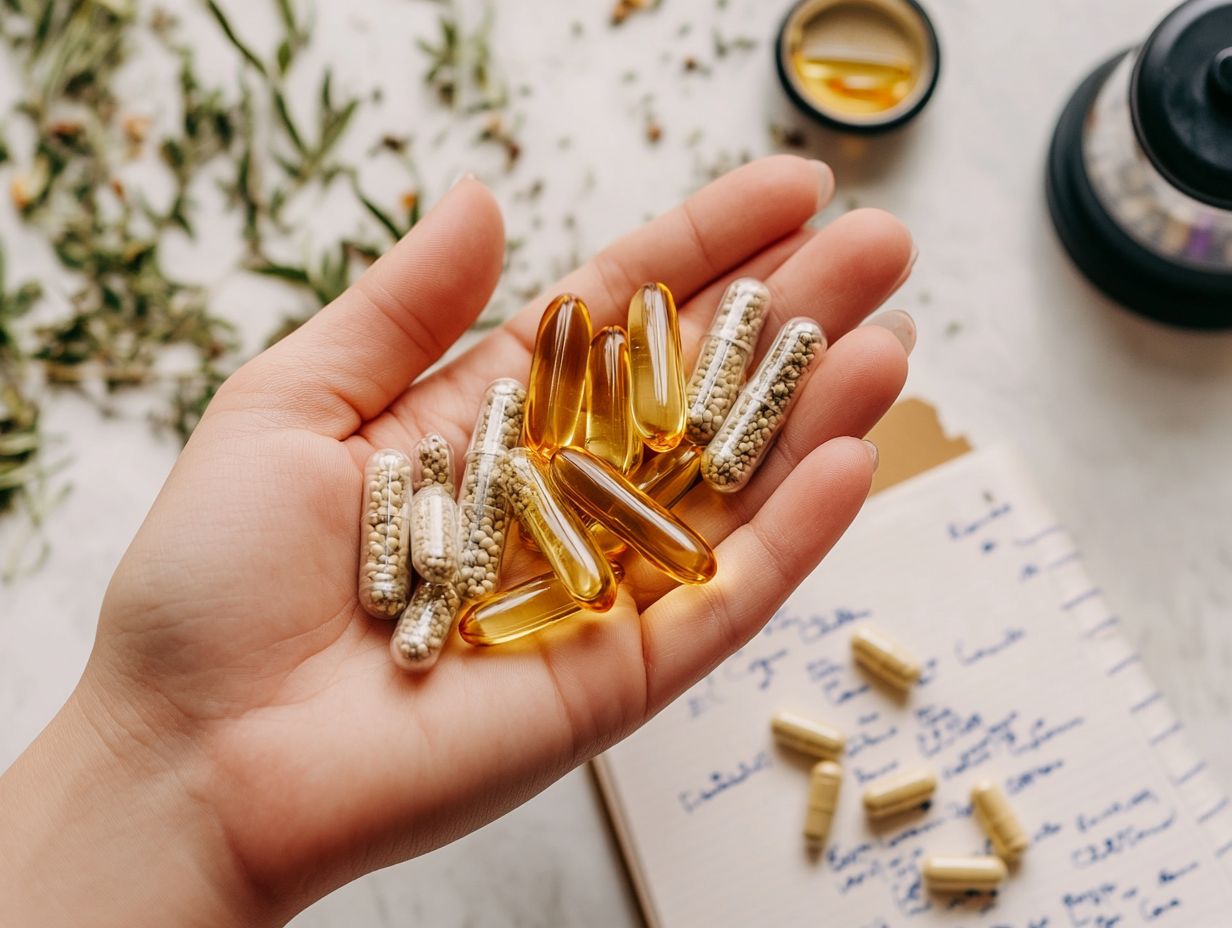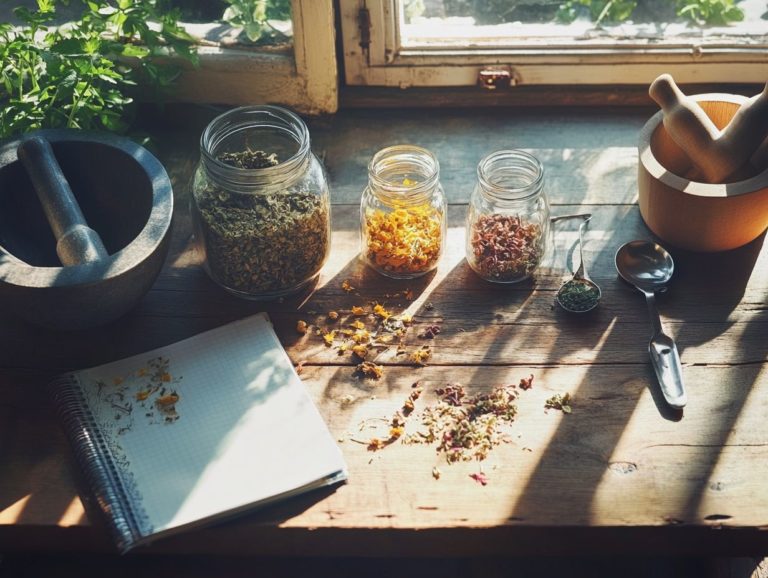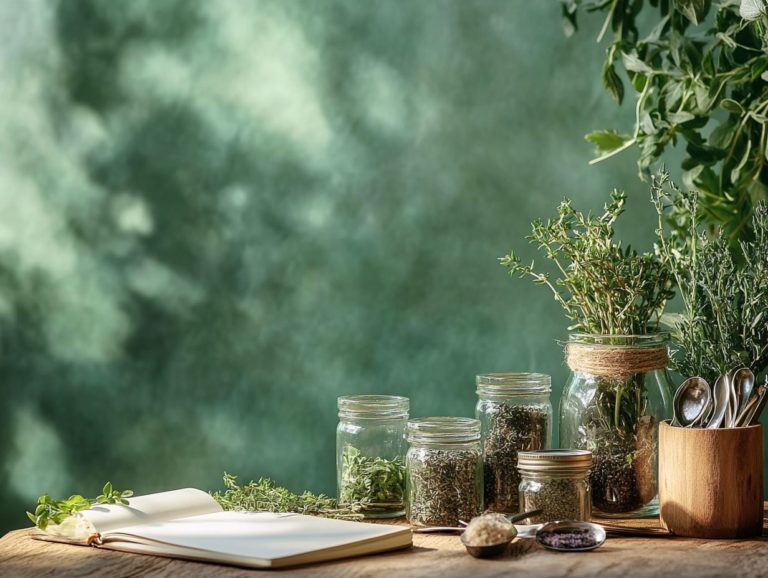When to Adjust Your Herbal Dosage
Navigating herbal remedies can be exciting yet challenging, especially when determining the right dosage.
Understanding herbal dosages is key to maximizing benefits and minimizing risks. This article explains what herbal dosages mean and the factors that influence them, such as your health profile and the different forms of herbs available.
You ll learn how to recognize when it s time to adjust your dosage and how to do it safely. We’ll also share tips for monitoring your body’s responses.
Whether you’re a seasoned herbal user or just starting, this guide helps you make informed choices to enhance your health.
Contents
- Key Takeaways:
- Understanding Herbal Dosages
- Factors that Influence Your Herbal Dosage
- Signs that Your Dosage Needs Adjustment
- How to Adjust Your Herbal Dosage and Enhance Your Health
- Tips for Finding the Right Dosage
- Frequently Asked Questions
- Curious about adjusting your herbal remedies?
- When should I adjust my herbal dosage?
- How will I know if I need to adjust my herbal dosage?
- Can I adjust my herbal dosage on my own?
- What factors can affect the effectiveness of my herbal dosage?
- Is it safe to adjust my herbal dosage frequently?
- Do I need to gradually increase or decrease my herbal dosage?
Key Takeaways:

Understanding Herbal Dosages
Herbal dosages refer to the exact amounts of herbal products, like tinctures or teas, necessary for effective treatment.
These dosages vary based on factors like the type of product, your health conditions, and personal needs. For instance, concentrated extracts may need smaller doses compared to bulk teas due to differences in potency. Understanding evaluating herbal potency for accurate dosage is also crucial, as your age, weight, and health status play a significant role in determining the right dosage.
Proper administration of herbal remedies is vital. Following recommended dosages helps you achieve the maximum benefits while reducing the risk of adverse effects. For more information, refer to Understanding Herbal Dosage: A Complete Guide. Incorrect dosages can lead to ineffective treatment or even harm, so careful consideration is essential.
Factors that Influence Your Herbal Dosage
Various factors affect the right dosage of herbal remedies, including your health conditions, sensitivities to specific herbs, and the formulation of the product. Understanding these elements is important for both practitioners and patients, as they influence the safety and effectiveness of herbal medicine.
Factors like age, weight, and existing health conditions impact how your body absorbs and responds to herbal products. This ultimately affects treatment outcomes for both acute issues and chronic conditions like anxiety.
Seeking advice from qualified herbalists and healthcare practitioners can provide valuable insights for dosage adjustments. This ensures you achieve optimal health results and effective treatment.
Individual Health and Sensitivities
Your health and sensitivities are crucial when determining the right amount of herbs you take and how those formulations can affect you.
These factors gain greater importance when considering any pre-existing health conditions or allergies that might affect how certain herbs work. Practitioners must carefully evaluate your unique health profile and your reactions to particular plants. A personalized approach to herbal medicine is essential. For those new to this practice, getting started with herbal dosage ensures your treatments are not only effective but also safe and well-tolerated.
By understanding your body’s unique characteristics, healthcare providers can recommend dosages that optimize your results while minimizing risks. This creates a more holistic healing experience tailored just for you.
Different Forms of Herbs

You can take herbs in various forms, including tinctures, teas, and supplements. Each has unique absorption qualities and dosage guidelines. Understanding these differences is essential for anyone looking to harness the power of herbal remedies.
Tinctures are concentrated extracts made with alcohol or glycerin. They are known for their rapid absorption into the bloodstream, providing quick therapeutic benefits.
Herbal teas, while soothing and enjoyable, often require larger amounts due to their lower potency and slower absorption rates in the digestive system.
If you re seeking immediate relief, tinctures may be your best option. Teas can serve as a wonderful choice for gradual wellness support. Ultimately, your choice should align with your health goals, daily routines, and personal preferences for taste and convenience.
Signs that Your Dosage Needs Adjustment
Recognizing the signs that your herbal dosage needs adjustment is vital for maintaining optimal health and preventing adverse effects. You might notice symptoms of underdosing, such as a lack of expected energy or relief from chronic and acute conditions.
Conversely, signs of overdosing can show up as adverse reactions or increased sensitivity to the herbal product. You must pay attention to these signals, whether you are a practitioner or a patient, to ensure your treatment with herbal remedies is safe and effective. For more information, refer to our guide on understanding the risks of improper herbal dosage.
Symptoms of Underdosing
Symptoms of underdosing can appear as persistent issues related to the condition you’re treating. You may experience fatigue or an overall lack of energy, signaling a need for adjustments.
If you’re using herbal remedies for anxiety, increased feelings of unease or restlessness may suggest your current dosage isn’t effective. If you’re tackling digestive issues, ongoing discomfort or irregular bowel movements could indicate something’s off. To address these concerns, consider how to create a safe herbal dosage plan. The intensity of these symptoms can vary based on the specific herbal product and the underlying condition.
It s essential to engage in open conversations with your healthcare practitioners about these experiences. This dialogue can lead to necessary dosage adjustments, ultimately resulting in better health outcomes and an enhanced sense of well-being.
Recognize the Signs: Are You Overdosing?
Signs of overdosing may include unwanted effects like nausea, dizziness, or increased sensitivity to the herbal product you’re using or other medications.
These symptoms can vary based on the herbal remedy. For instance, consuming too much valerian root may lead to severe headaches or gastrointestinal discomfort. In contrast, overusing ginseng could cause heightened anxiety or agitation. Herbs like St. John’s Wort can also cause unexpected side effects, including sensitivity to sunlight or digestive issues. If you think you might have overdosed, get medical help right away! Your health is too important to wait.
Consulting with a healthcare practitioner is vital for identifying the best course of action and ensuring a safe recovery, especially considering any underlying health conditions or medications that may interact with the herbal remedy. It’s also important to understand the dos and don’ts of herbal dosage, including potential interactions with Chinese medicine.
How to Adjust Your Herbal Dosage and Enhance Your Health
Thinking about changing your herbal dosage? Talk to a healthcare professional first! This ensures that any adjustments are based on sound medical advice and offers a safety net that self-directed changes usually lack.
When preparing for your consultation, compile a list of all current medications and herbal supplements, including their dosages and frequencies. This gives the practitioner a comprehensive view of your regimen. Sharing recent changes in your health status or any side effects you’ve noticed can help create a safe and effective treatment plan. An open dialogue is essential for optimizing your outcomes and minimizing risks.
Gradually Adjusting Your Dosage
Adjusting your herbal dosage slowly helps reduce risks and boosts effectiveness.
To achieve the best outcomes, follow a structured approach. Make each adjustment in small increments. Pay close attention to your symptoms, as monitoring changes in both your physical and emotional states can provide valuable insights into how your body is responding.
Keeping a daily log will greatly help you track your progress over time. Remember, this journey requires patience and consistency; rushing the process can lead to unforeseen complications and lessen the effectiveness of your treatment regimen.
Tips for Finding the Right Dosage
Finding the right herbal dosage requires a combination of meticulous monitoring and strategic adjustments. This approach ensures that you achieve the most effective treatment outcomes.
Keeping a Dosage Journal
Your health journey is exciting! Keeping a dosage journal can serve as an invaluable tool for you to track your herbal remedies and their effects on your health.
By diligently noting the specific herbs you take, their dosages, and the times of day you consume them, you can create a comprehensive record that reveals patterns and outcomes. Incorporating observations about your mood, energy levels, and any side effects will further enrich your understanding of how each remedy interacts with your body’s unique responses. Additionally, understanding the impact of herbal quality on dosage safety can help ensure that your herbal use is both effective and safe.
This meticulous documentation not only empowers you to make informed adjustments to your regimen but also provides valuable insights for your healthcare practitioners.
This collaborative approach fosters improved communication, ultimately enhancing treatment efficacy and supporting personalized healthcare plans that cater to your specific needs.
Monitoring Your Body’s Response
Monitoring your body’s response to herbal remedies is crucial for assessing the effectiveness of your dosage. Paying attention to any changes be they positive or negative can yield valuable insights into how these natural alternatives interact with your unique physiology.
Keeping a detailed journal of your symptoms, including the timing and severity, will help you recognize patterns over time. This practice not only enhances your self-awareness, but also equips you with specific information to share during consultations with healthcare practitioners.
Engaging in open communication about the effects you observe, as well as any side effects, fosters a collaborative approach. This leads to informed discussions about potential dosage adjustments.
Understanding how lifestyle factors like diet and stress influence these responses is crucial for optimizing the benefits of herbal remedies.
Frequently Asked Questions

Curious about adjusting your herbal remedies?
When should I adjust my herbal dosage?
You should adjust your herbal dosage if you experience any negative side effects or if you are not seeing any improvement in your condition after a certain period of time. Additionally, if your symptoms have changed or worsened, it may also be necessary to adjust your dosage.
How will I know if I need to adjust my herbal dosage?
One of the main indicators is if you experience any adverse reactions such as stomach upset, headaches, or dizziness. If you notice any changes in your symptoms, it may also be a sign that your dosage needs to be adjusted.
Can I adjust my herbal dosage on my own?
We recommend consulting with a qualified herbalist or healthcare practitioner before making any changes to your herbal dosage. They can assess your condition and make recommendations for the appropriate dosage based on your specific needs.
What factors can affect the effectiveness of my herbal dosage?
Several factors can impact the effectiveness of your herbal dosage, including:
- Your age
- Your weight
- Your overall health
- The severity of your condition
It’s important to regularly monitor your progress and adjust your dosage accordingly.
Is it safe to adjust my herbal dosage frequently?
It’s best to follow the recommended dosage instructions provided by your herbalist or healthcare practitioner. Making frequent adjustments to your dosage without professional guidance can be risky and may not yield the desired results.
Do I need to gradually increase or decrease my herbal dosage?
In most cases, it’s recommended to gradually increase or decrease your herbal dosage to allow your body to adjust and minimize any potential side effects. However, it’s important to follow the specific instructions provided by your healthcare provider or herbalist.






